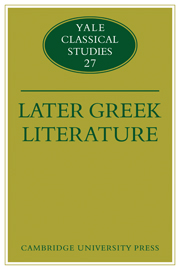Book contents
- Frontmatter
- Contents
- Introduction
- Theme, structure and narrative in Chariton
- The importance of sophists
- Lucian: a sophist's sophist
- The mendacity of Kalasiris and the narrative strategy of Heliodoros' Aithiopika
- The Emperor Julian on his predecessors
- Greek translations of Latin literature in the fourth century A.D.
- The empress and the poet: paganism and politics at the court of Theodosius II
- Pastiche, pleasantry, prudish eroticism: the letters of ‘Aristaenetus’
- The date and purpose of the Philopatris
The importance of sophists
Published online by Cambridge University Press: 06 December 2010
- Frontmatter
- Contents
- Introduction
- Theme, structure and narrative in Chariton
- The importance of sophists
- Lucian: a sophist's sophist
- The mendacity of Kalasiris and the narrative strategy of Heliodoros' Aithiopika
- The Emperor Julian on his predecessors
- Greek translations of Latin literature in the fourth century A.D.
- The empress and the poet: paganism and politics at the court of Theodosius II
- Pastiche, pleasantry, prudish eroticism: the letters of ‘Aristaenetus’
- The date and purpose of the Philopatris
Summary
Studies of the Second Sophistic are necessarily founded upon the Lives of Philostratus, our source for the term itself: and it is now a decade since Glen Bowersock's Greek Sophists in the Roman Empire added depth and breadth to Philostratus' picture in an illuminating presentation of their cultural, social and political roles which has rightly become a standard work. Both Philostratus and Bowersock seem to present sophists as men who acquire political authority through their professional status. Philostratus lays out a mosaic of anecdotes and assessments without much that could be called historical analysis to give it shape: our attention is drawn to consular ancestors or descendants, city offices and benefactions, encounters and friendships with emperors in such a way that we gain the impression that they all derive from the practice of sophistic skills. Bowersock's investigation, by contrast, is carefully articulated and historically argued. Separate consideration is accorded to the sophists' origins in the city aristocracies of the Eastern provinces and their benefactions to these cities; to their acquisition of immunity from offices and liturgies; to their contact with emperors as ambassadors, friends and holders of equestrian and senatorial posts. Yet to my eye the perspective in which these marks of distinction are presented is sometimes distorted, and the distortion affects the truth or falsehood of Bowersock's insistence upon the historical (as opposed to literary) importance of the sophists.
- Type
- Chapter
- Information
- Later Greek Literature , pp. 29 - 60Publisher: Cambridge University PressPrint publication year: 1982
- 9
- Cited by



